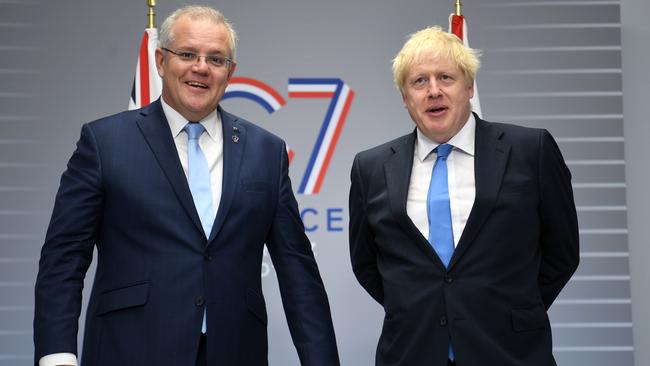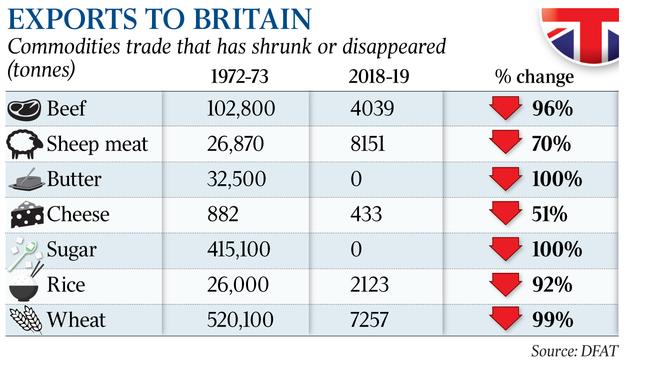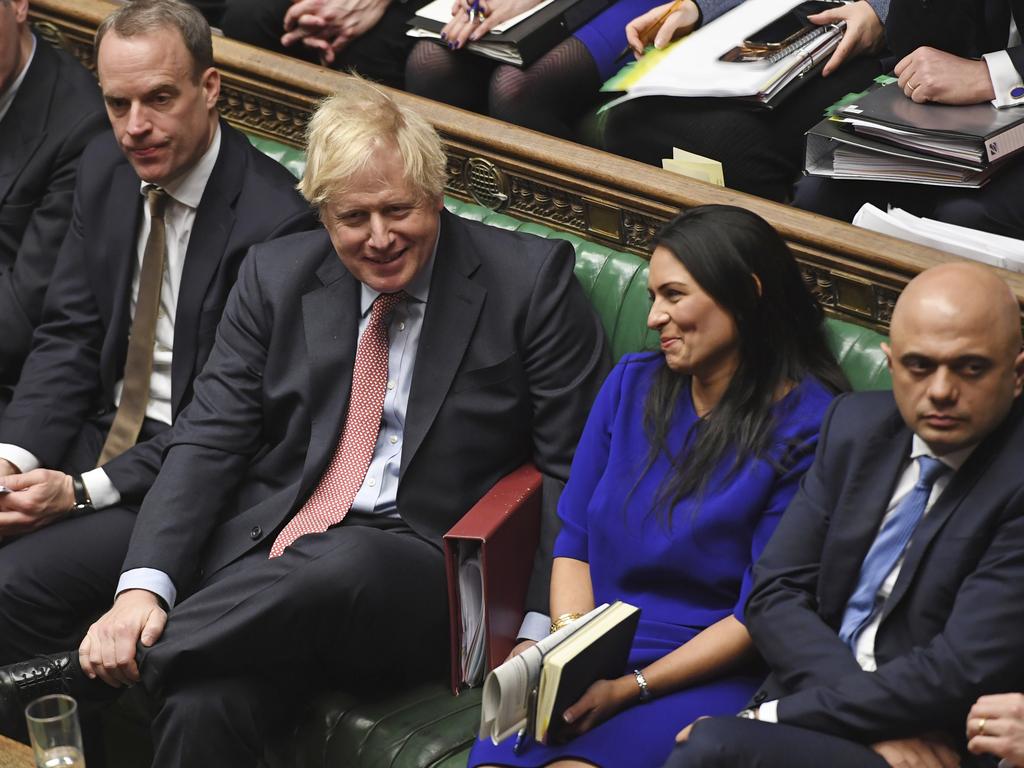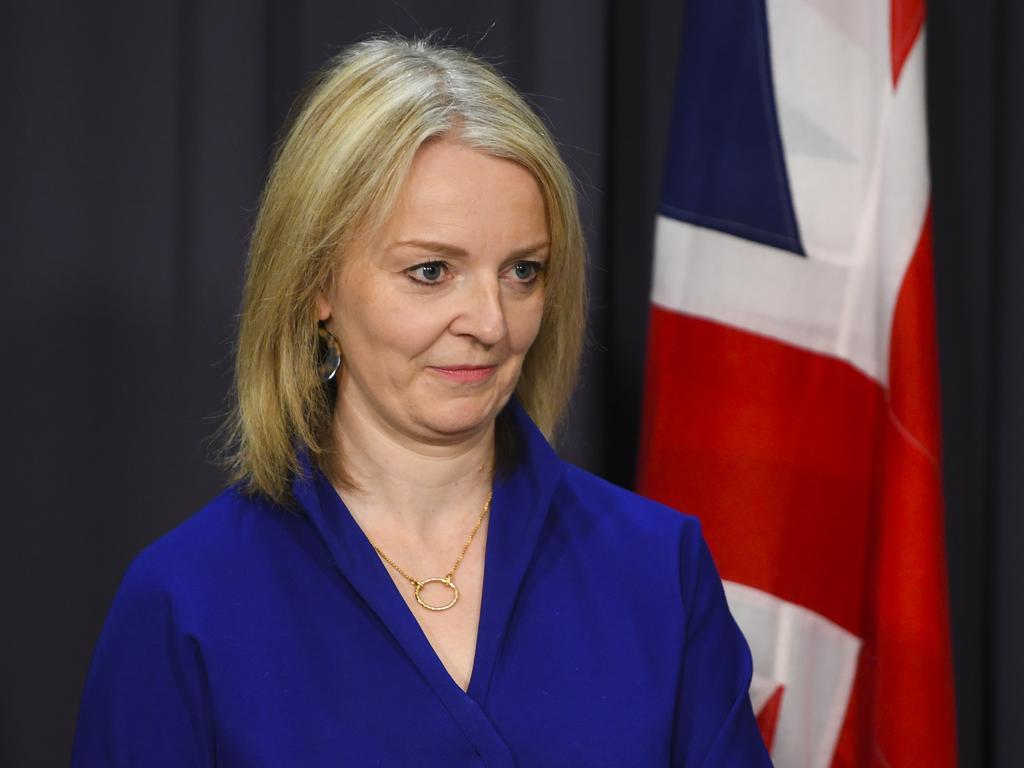Brexit: UK open for quick trade talks
Scott Morrison moves to finalise a trade deal with Boris Johnson before the end of 2020.

Scott Morrison will move to finalise a free-trade deal with British Prime Minister Boris Johnson before the end of the year as the divorce between Britain and the EU unlocks the potential to lower tariffs, quotas and barriers for Australian farmers, winemakers and investors.
Britain’s departure from the EU after more than three years of damaging Brexit talks will accelerate negotiations, with Trade Minister Simon Birmingham expected to meet British officials within two months.
An Australian trade negotiating team is ready to begin official talks once the British government works through its cabinet processes. Senior trade experts are also in place at the high commission in London.
While the British government prioritises trade deals with the EU and the US, Senator Birmingham said they were “ready to roll as soon as they are happy to begin the process”, with expectations of Britain re-entering Australia’s top 10 trading partners.
As China grapples with coronavirus and swine fever outbreaks, trade deals with Britain and the EU are viewed as crucial to foster new opportunities for Australian exporters. Senator Birmingham says the government will seek the “best possible outcomes for our industries”, mounting an argument in favour of open, liberalised arrangements based on new tariff and quota settings.
“Just as the UK is a market for high-value brands and commodities, so too is Australia. The focus has to be on the value of the goods we sell and services we provide and maximising that value equation,” Senator Birmingham says.
Former trade minister Andrew Robb — the architect of Australia’s free-trade agreements with China, Japan and South Korea — said the opportunities of a British FTA hinged on improved market access for Australian farmers.
“It will take quite a lot of adjustment in the UK for them to remove a lot of the assistance and protection for many of the agricultural products … It’s going to require a will on their part that hasn’t existed,” he said.
“They have had structured tariffs for 40 years but leaving the EU doesn’t remove them. They need to have the disposition to do it.”

Writing in The Australian, Senator Birmingham says it is hoped a deal will be in place before next January 1, when “all legal trade relationships with the UK starts afresh”.
He says Australia is “at or near the very front of the queue” as Britain prioritises its major trade deals.
“We have already settled some agreements with the UK that will come into operation on 1 January, 2021. These will ensure continuity of co-operation on nuclear issues, access for Australian wines and mutual recognition of certain standards.
“Given the geographical distance and dramatic changes to the global economy, especially within our region, some will ask if an FTA with the UK would be worth worrying about in 2020. History informs us of what might be possible.
“Australia was a casualty of the UK’s entry into the European Economic Community. In 1973, the UK was Australia’s third largest two-way goods trading partner. Now it is our 12th.”
Senator Birmingham says agricultural trade went from being a significant supplier of goods to Britain to “losing virtually all of our market share”.
“Over the last 48 years, beef exports to the UK plummeted by 96 per cent, sheep meat by 70 per cent, rice by 98 per cent and wheat by 99 per cent. Exports of sugar and butter have been completely eliminated.”
While conceding a return to similar volumes of agricultural trade was unlikely because of trade deals with China, Japan, South Korea, Indonesia, the US and Trans-Pacific Partnership nations, Senator Birmingham says “having more options can only be a good thing for our primary producers”.
“That’s why we will seek the elimination of tariffs, quotas and non-tariff barriers as widely as possible.
“What’s more, the success of Australian wine sales to the UK, where one in five bottles sold is Australian wine (despite facing a tariff that doesn’t currently apply to European wines), demonstrates that there remains a hunger in the UK market for safe, high quality Australian produce.
“The UK won’t return to being our third-largest trading partner but we should aspire for it to re-enter the top 10.”
National Farmers Federation chief executive Tony Mahar said Australian farmers were in close contact with their British counterparts and were highly interested in the “mature, high value market”.
“We’re export-focused so we are very new markets and we are watching closely … things like red meat, dairy and horticulture all have strong potential,” Mr Mahar said. “We want to see reduced tariffs, improved quotas. Those will be contentious and we are talking to the National Farmers Union in the UK. Farmers like to talk to other farmers.”
Mr Mahar said while Australian farmers would have high interest in entering the British market, the larger Asian markets meant they would not be “flooding the market”.
Australian-British Chamber of Commerce chief executive David McCredie said removing the foreign investment board’s $250m to $1bn cap on British investors would be a good start to a new trade agreement. “The investment side is as important as the trade side … removing that threshold and the $250m-$1bn red tape process would be an important step. If the Australian government is to meet its growth targets, it will need more investment,” Mr McCredie said.
Business Council of Australia chief executive Jennifer Westacott said a Britain-Australia agreement would offer the opportunity of new jobs in Australia and new markets for exporters.
“After years of debate, a Brexit deal has been settled, giving businesses greater certainty. That means they can get on with their role investing and creating jobs in Australia, the UK and in Europe,” she said.
“An Australia-UK free-trade agreement would be a win for Australians, giving our exporters even greater access to one of our oldest trading partners and offering new opportunities for job creating foreign investment to flow into the nation.”
Australian Industry Group chief executive Innes Willox said Brexit would deliver much needed certainty to Australian and global businesses. He identified winemakers and Qantas as potential big winners and flagged the possible need for a high-level business delegation to Britain in the later stages of negotiations. “Qantas’s direct flights from Perth to London may also assist fresh horticultural and seafood exports into the UK … to take advantage of the even playing field WTO rules will give Australia,” he said.






To join the conversation, please log in. Don't have an account? Register
Join the conversation, you are commenting as Logout